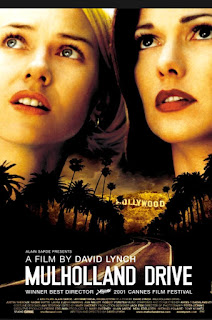The movie kicks off with a car accident, along the winding Mulholland Drive in the Hollywood hills, that sees a young female passenger (played by Laura Harring) solely survive after a period of unconsciousness but suffering amnesia as a result. After walking through the woods - the wilderness? - she takes shelter in a recently vacated apartment in order to try and recollect herself. Meanwhile, flying in to town is Betty (Naomi Watts), an aspiring actress from the Midwest who has a room to stay in her aunt's residential complex. When she arrives at the flat, it happens to be the same place as the accident victim, who takes the name "Rita" after seeing a poster inside featuring the actress Rita Hayworth.
Their meeting begins the intertwining of a relationship which, to the audience, ranges in complexities and goes on to make the viewer question what actually is going between the pair, whilst once again reinforcing the notion that not everything is what they seem: are they really acquaintences? Do they really become more? How do we even believe they become as close as they're portrayed to begin with upon Betty's arrival at the flat? Betty's own character seems to become less wholesome, akin to an orange skin being peeled off: while only acting herself, she shows a more vixenous streak in a film audition which she rehearses with Rita, in a manner that again raises questions about their interaction once the scene abruptly begins.
A subplot follows in the form of movie director Adam (Justin Theroux) who initially has it all: a career, marriage, nice clothes, a flashy car and big house. His control over everything erodes from his mere introduction when a gangster boss (Dan Hedaya) dictates whom the female lead in Adam's new picture will be. Further turmoil unfolds as he comes home to find his wife cheating on him. He is later seen in a dark bedsit, completely contradicting his marital home surroundings, where he takes a call from a mysterious cowboy (Monty Montgomery). A meeting between the two sees the latter reinforce the notion that Adam must comply with the actress forcefully appointed for him.
Just when the audience get comfortable, the film shifts to its centrepiece: a late-night cabaret venue named Club Silencio, where singer Rebekah Del Rio (herself) hauntingly delivers a Spanish, a cappella rendition of Roy Orbison's "Crying". Yet the singer collapses on stage - and the song keeps going. Her apparent singing also isn't what it seems. We're left to think again - especially when we're suddenly introduced to Diane, a struggling actress who looks remarkably similar to Betty, and the penny begins to drop that we're now privy to different realities, back-to-back. Her story develops in to an abyss of sorts where desperation has led to the flip-side of what Betty's life was like.
This film is either an analyst's dream or nightmare as so much could be, and has been, looked at repeatedly under the proverbial microscope. With a structure eerily similar of Pulp Fiction and a likely influence on The Butterfly Effect, the beauty of Mulholland Drive is it keeps us guessing by changing whom we believe to be the main character. When we start to think it was Adam, it apparently turns out to be Betty or Diane. Then again, it could be Rita, or Camilla as another similarly-featured character comes to light in the second half. You will walk away needing to re-watch it. You will finish the film with more questions than answers; not least when Diane hires an assassin to kill her ex-lover and the man is portrayed in an earlier lifetime for having botched a previous hit.
Music plays as much an important part as the acting. Aside from the "Crying" scene, the instrumental score does little to settle from the beginning, whilst actress Camilla (initially Melissa George of Home And Away fame) herself sings only to distort the atmosphere during the filming studio sequence. All in all, Mulholland Drive makes for compelling viewing from start to finish. Initially conceived as a 90-minute television special, the additional hour allowed Lynch a Best Director Oscar nomination and turn a profit at the box office. An end-of-weekend romantic comedy, it is not.




Comments
Post a Comment